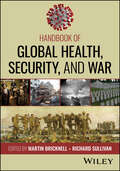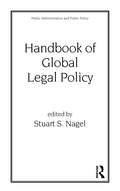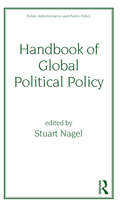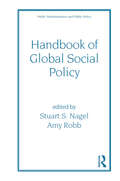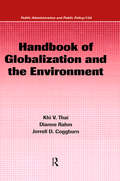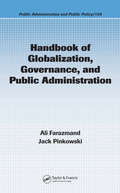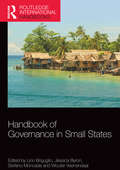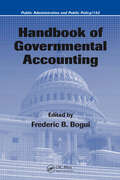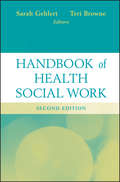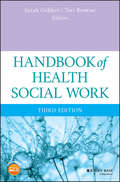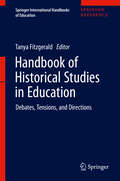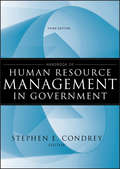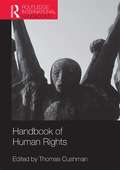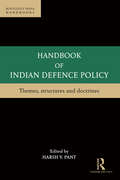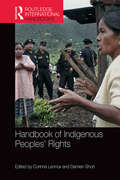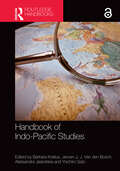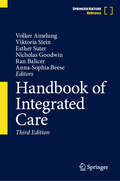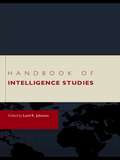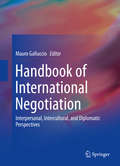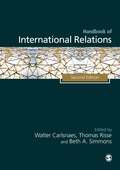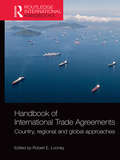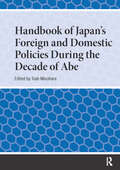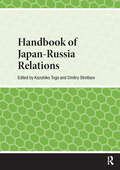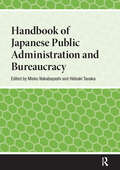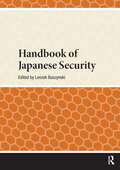- Table View
- List View
Handbook of Global Health, Security, and War
by Richard Sullivan Martin BricknellAn insightful and contemporary review of current global health threats and their implications for security and stability In the Handbook of Global Health, Security, and War, Professors Martin Bricknell and Richard Sullivan deliver a fresh, multidisciplinary take on the relationship between health and international affairs. The book explores the most relevant global health threats and their implications for security and stability, providing an up-to-date and authoritative perspective on these international challenges. This practical guide addresses the unprecedented range of threats to health around the world and their potential to impact the security of populations, states, and the global system. It discusses the academic theories that form the foundations for analysis of global health and international relations. It also examines the impact of insecurity and war on health systems, clinical health services, and the health research and policy agenda. Readers will also find: A thorough introduction to global health and the relationships between determinants of health, health systems, and health servicesComprehensive explorations of the three dimensions of human security, state security, and global security and their relationships to healthPractical discussions of the health impacts of warA summary of international humanitarian law and ethics as constraints on war and human barbarism Perfect for undergraduate and postgraduate students with an interest in global health and security, the Handbook of Global Health, Security, and War will also benefit social scientists, researchers in global health, and humanitarian practitioners.
Handbook of Global Legal Policy (Public Administration and Public Policy)
by Stuart S. NagelFeaturing a pragmatic approach to coping with the legal complications surrounding pretrial release, drug-related crime, and freedom of religion, among other issues, this timely reference presents a host of legal policy problems in diverse political and cultural settings throughout the world. Contributors bridge the academic gulf between worldwide and public policy studies, as well as the ideological gap between liberal and conservative attitudes toward constitutional law, individual liberty, public safety, and human rights. The authors emphasize the need for an integrated, "one-world" perspective in the international legal community, drawing on over 1200 references, tables, and illustrations.
Handbook of Global Political Policy (Public Administration and Public Policy)
by Stuart NagelThe latest in the six-volume set of global policy handbooks, this reference utilizes a cross-national, cross-policy approach to examine the public policy of six different regions around the world. Combining actual and theoretical perspectives, the book compares and presents nonideological resolutions to current political conditions worldwide. With contributions from over 30 international policy experts and academicians and containing over 1200 literature references, tables, and drawings, the book is an insightful resource for public administrators and public policy experts, political scientists, economists, sociologists, attorneys, and students in these disciplines.
Handbook of Global Social Policy (Public Administration and Public Policy)
by Stuart S. Nagel Amy RobbDiscussing how to use public policy to improve the quality of life for those at the bottom of the social hierarchy, this text makes the case for policy that expands employment and facilitates jobs, finances education and economic and cultural integration, rewards merit, and encourages voting and political participation. Political scientists from around the world measure the effect of democratization, religion, ethnicity, race, and mass media on internal conflict during the initial post-Cold War period, in Africa, Asia, Europe, and Latin and North America. Some topics include the role of mass communication on Egyptian family planning, Russian nationalism, and the Guatemalan peace process.
Handbook of Globalization and the Environment (Public Administration and Public Policy)
by Khi V. Thai Dianne Rahm Jerrell D. CoggburnProponents of globalization argue that it protects the global environment from degradation and promotes worldwide sustainable economic growth while opponents argue the exact opposite. Examining the local, national, and international impacts of globalization, the Handbook of Globalization and the Environment explores strategies and solutions that support healthy economic growth, protect the environment, and create a more equitable world. The book sets the stage with coverage of global environmental issues and policies. It explores international sustainable development, the evolution of global warming policy, transborder air pollution, desertification, space and the global environment, and human right to water. Building on this foundation, the editors discuss global environmental organizations and institutions with coverage of the UN's role in globalization, the trade-environment nexus, the emergence of NGOs, and an analysis of the state of global environmental knowledge and awareness from an international and comparative perspective. Emphasizing the effects of increasingly integrated global economy on the environment and society, the book examines environmental management and accountability. It addresses green procurement, provides an overview of U.S. environmental regulation and the current range of voluntary and mandatory pollution prevention mechanisms in use, explores a two-pronged approach to establishing a sustainable procurement model, and examines a collaborative community-based approach to environmental regulatory compliance. The book concludes with an analysis of controversial issues, such as eco-terrorism, North-South disputes, environmental justice, the promotion of economic growth through globalization in less developed countries, and the ability of scientists to communicate ideas so that policy makers can use science in decision making.
Handbook of Globalization, Governance, and Public Administration (Public Administration and Public Policy)
by Ali FarazmandGlobalization transcends borders and cultures as it develops both from the natural flow of information and communication technologies and as a directed and driven quest for global hegemony by self-serving corporations and world political heavyweights. It bears a multifaceted web of influence that manifests in inequalities in growth, prosperity, and
Handbook of Governance in Small States (Routledge International Handbooks)
by Lino Briguglio, Jessica Byron, Stefano Moncada and Wouter VeenendaalThis volume covers a wide spectrum of governance issues relating to small states in a global context. While different definitions of governance are given in the chapters, most authors associate governance with the setting and implementation of policies aimed at managing a country or territory, and with the related institutional structures and interventions by political actors. Generally, good governance is associated with concepts such as policy effectiveness, accountability, transparency, control of corruption, encouragement of citizens’ voice and gender equality—factors which are, in turn, linked with democracy. What emerges from the book is that the societies of small states are being re-shaped by various forces outside their control, including the globalization process and climate change, rendering their governance ever more complex. These problems are not solely faced by small states, but small country size tends to lead to a higher degree of exposure to external factors. The chapters are grouped into four sections broadly covering political, environmental, social and economic governance. Governance is influenced by many, often intertwined, factors; the division of the book into four parts therefore does not detract from the fact that governance is multifaceted, and such division was based on the primary focus of each particular study and its main disciplinary background. The expert authors have, moreover, used a variety of approaches in the studies, the subject of small states being well suited to scholarly work from different disciplines using qualitative, quantitative and mixed approaches to arrive at useful conclusions.
Handbook of Governmental Accounting (Public Administration and Public Policy)
by Frederic B. BoguiDemystifying a growing and dynamic field, Handbook of Governmental Accounting reflects the increasing complexity of this area, enabling readers to grasp the intricate accounting that is involved as government expenditures multiply and governments engage in progressively complex transactions. Drawing on the expertise of a distinguished group of cont
Handbook of Health Social Work
by Sarah Gehlert Teri BrownePraise for Handbook of Health Social Work Second Edition "Handbook of Health Social Work, Second Edition is a crucial addition for seasoned practitioners' libraries, as well as an essential foundation for fledgling social workers ready to enter health as a practice and research area. " -From the Foreword by Suzanne Heurtin-Roberts, U. S. Department of Health and Human Services "The book's strengths include the high quality of writing and the expertise of its contributors. It covers the field of health social work in significant depth and is sure to leave readers well informed. " -Mary Sormanti, PhD, MSW, Associate Professor of Professional Practice, Columbia University School of Social Work "Quite simply, this is the definitive volume for health and social work. In this second edition, Gehlert and Browne and their expert contributors have confidently managed to keep pace with current theory and empirical research across a wide range of subject matter that will be of interest to practitioners, educators, and researchers. " -Michael Vaughn, PhD, Assistant Professor, School of Social Work, School of Public Health, and Department of Public Policy Studies, Saint Louis University Thoroughly revised and updated, the only comprehensive handbook of its kind covering the diverse field of health social work Now in its Second Edition, Handbook of Health Social Work provides a comprehensive and evidence-based overview of contemporary social work practice in health care. Written from a wellness perspective, the chapters cover practice and research areas ranging from chronic disorders to infectious disease, from physical to mental disorders, and all areas in between. An excellent resource preparing social workers for the present and future challenges of practice in the field of health care,, The Handbook of Health Social Work, Second Edition features discussion on: New trends in social work and health care, including genetics, transdisciplinary care, as well as national and state changes in policy Health social work and children The wide array of roles performed by social workers in health-care settings Ethical issues and decision making in a variety of arenas Understanding of community factors in health social work Edited by two respected leaders in the field of health social work, this second edition includes contributions from a diverse team of notable experts, researchers, and scholars addressing multiple theoretical foundations, models, issues, and dilemmas for the social worker in health care. The resulting resource offers both a foundation for social work practice in health care and a guide for strategy, policy, and program development in proactive and actionable terms.
Handbook of Health Social Work
by Sarah Gehlert Teri BrowneThe updated third edition of the definitive text on health social work Thoroughly revised and updated, the third edition of Handbook of Health Social Work is an authoritative text that offers a comprehensive review of the diverse field of health social work. With contributions from a panel of international experts in the field, the book is theory driven and solidly grounded in evidence-based practice. The contributors explore both the foundation of social work practice and offer guidance on effective strategies, policies, and program development. The text provides information that is essential to the operations of social workers in health care including the conceptual underpinnings and the development of the profession. The authors explore the practice issues such as theories of health behavior, assessment, communication and the intersections between health and mental health. The authors also examine a wide range of examples of social work practices including settings that involve older adults, nephrology, oncology, and chronic diseases such as diabetes, heart disease, HIV/AIDS, genetics, end of life care, pain management and palliative care, as well as alternative treatments, and traditional healers. This is the only handbook of its kind to unite the body of health social work and: • Offers a wellness, rather than psychopathological perspective and contains treatment models that are evidence-based • Includes learning exercises, further resources, research suggestions, and life-course information. • Contains new chapters on topics such as international health, insurance and payment systems, and implementation of evidence-based practice • Presents information on emerging topics such as health policy in an age of reform, and genomics and the social environment • Reviews new trends in social work and health care including genetics, trans-disciplinary care, and international, national, and state changes in policy Written for social work educators, administrators, students, and practitioners, the revised third edition of Handbook of Health Social Work offers in one volume the entire body of health social work knowledge.
Handbook of Historical Studies in Education: Debates, Tensions, and Directions (Springer International Handbooks of Education)
by Tanya FitzgeraldThis book offers an in‐depth historiographical and comparative analysis of prominent theoretical and methodological debates in the field. Across each of the sections, contributors will draw on specific case studies to illustrate the origins, debates and tensions in the field and overview new trends, directions and developments. Each section includes an introduction that provides an overview of the theme and the overall emphasis within the section. In addition, each section has a concluding chapter that offers a critical and comparative analysis of the national case studies presented. As a Handbook, the emphasis is on deeper consideration of key issues rather than a more superficial and broader sweep. The book offers researchers, postgraduate and higher degree students as well as those teaching in this field a definitive text that identifies and debates key historiographical and methodological issues. The intent is to encourage comparative historiographical perspectives of the nominated issues that overview the main theoretical and methodological debates and to propose new directions for the field.
Handbook of Human Resource Management in Government
by Stephen E. CondreyThe practice of public human resource management has evolved significantly in recent years due toincreased outsourcing, privatization, and the diminution of public employee rights. This thoroughly revised and updated edition of the classic reference Handbook of Human Resource Management in Government offers authoritative, state-of-the-art information for public administrators and human resource professionals. The third edition features contributions from noted experts in the field, including Donald E. Klingner, Mary E. Guy, Jonathan P. West, Jeffrey L. Brudney, Montgomery Van Wart, J. J. Steven Ott, Norma M. Riccucci, and many more.Praise for the Handbook of Human Resource Management in Government"This third edition of the Handbook of Human Resource Management in Government is an essential resource for scholars, practitioners, and general readers in need of concise summaries of up-to-date, cutting-edge, public personnel administration research. No other handbook on the market more concisely, more comprehensively, more clearly synthesizes this vast, rapidly changing field that remains so vital to effective government performance." -Richard Stillman, editor-in-chief, Public Administration Review"The Handbook of Human Resource Management in Government comprehensively and seamlessly blends theory and practice. The result is a clear road map that can finally make HR a key player in helping thegovernment meet the unprecedented challenges facing our nation, our states, and our communities." -Bob Lavigna, vice president, Research, Partnership for Public Service, Washington, DC"With each successive edition, Condrey's Handbook of Human Resource Management in Governmentbecomes a more essential tool for graduate students who wish to improve their understanding of this field. Condrey's own expertise has enabled him to take contributions from leading experts in the field and shape them into a reader that is comprehensive, engaging, and authoritative."-Donald E. Klingner, University of Colorado Distinguished Professor, School of Public Affairs, University of Colorado at Colorado Springs; former president, American Society for Public Administration; and fellow, National Academy of Public Administration"For anyone concerned with HRM in government, this updated and expanded volume is 'must reading.'"-Meredith Newman, president, American Society for Public Administration
Handbook of Human Rights (Routledge International Handbooks)
by Thomas CushmanIn mapping out the field of human rights for those studying and researching within both humanities and social science disciplines, the Handbook of Human Rights not only provides a solid foundation for the reader who wants to learn the basic parameters of the field, but also promotes new thinking and frameworks for the study of human rights in the twenty-first century. The Handbook comprises over sixty individual contributions from key figures around the world, which are grouped according to eight key areas of discussion: foundations and critiques; new frameworks for understanding human rights; world religious traditions and human rights; social, economic, group, and collective rights; critical perspectives on human rights organizations, institutions, and practices; law and human rights; narrative and aesthetic dimension of rights; geographies of rights. In its presentation and analysis of the traditional core history and topics, critical perspectives, human rights culture, and current practice, this Handbook proves a valuable resource for all students and researchers with an interest in human rights.
Handbook of Indian Defence Policy: Themes, Structures and Doctrines
by Harsh V. PantIndia has the world’s fourth largest military and one of the biggest defence budgets. It asserts its political and military profile in South Asia and the Indian Ocean region. The nation has been in the midst of an ambitious plan to modernize its largely Soviet-era arms since the late 1990s and has spent billions of dollars on latest high-tech military technology. This handbook: canvasses over 60 years of Indian defence policy and the major debates that have shaped it; discusses several key themes such as the origins of the modern armed forces in India; military doctrine and policy; internal and external challenges; and nuclearization and its consequences; includes contributions by well-known scholars, experts in the field and policymakers; and provides an annotated bibliography for further research. Presented in an accessible format, this lucidly written handbook will be an indispensable resource for scholars and researchers of security and defence studies, international relations and political science, as well as for government think tanks and policymakers.
Handbook of Indigenous Peoples' Rights (Routledge International Handbooks Ser.)
by Corinne Lennox Damien ShortThis handbook will be a comprehensive interdisciplinary overview of indigenous peoples’ rights. Chapters by experts in the field will examine legal, philosophical, sociological and political issues, addressing a wide range of themes at the heart of debates on the rights of indigenous peoples. The book will address not only the major questions, such as ‘who are indigenous peoples? What is distinctive about their rights? How are their rights constructed and protected? What is the relationship between national indigenous rights regimes and international norms? but also themes such as culture, identity, genocide, globalization and development, rights institutionalization and the environment.
Handbook of Indo-Pacific Studies (Indo-Pacific in Context)
by Barbara Kratiuk, Jeroen J. J. Van den Bosch, Aleksandra Jaskólska and Yoichiro SatoThis handbook explores the significance of the Indo-Pacific in world politics. It shows how the re-emergence of the Indo-Pacific in international relations has fundamentally changed the approach to politics, economics and security. The volume: explores the themes related to trade, politics and security for better understanding of the Indo-Pacific and the repercussions of the region's emergence studies different security and political issues in the region: military competition, maritime governance, strategic alliances and rivalries, and international conflicts analyses various socio-economic dimensions of the Indo-Pacific, such as political systems, cultural and religious contexts, and trade and financial systems examines the strategies of various states, such as the United States, Japan, India and China, and their approaches towards the Indo-Pacific covers the role of middle powers and small states in detail Interdisciplinary in approach and with essays from authors from around the world, this volume will be indispensable to scholars, researchers and students in the fields of international relations, politics and Asian studies.
Handbook of Integrated Care
by Volker Amelung Viktoria Stein Nicholas Goodwin Ran Balicer Esther Suter Anna-Sophia BeeseThis handbook shares profound insights into the main principles and concepts of integrated care. It offers a multi-disciplinary perspective with a focus on patient orientation, efficiency, and quality by applying widely recognized management approaches to the field of healthcare. The handbook also highlights international best practices and shows how integrated care can work in various health systems. In the majority of health systems around the world, the delivery of healthcare and social care is characterised by fragmentation and complexity. Consequently, much of the recent international discussion in the fields of health policy and health management has focused on the topic of integrated care. &“Integrated&” acknowledges the complexity of patients&’ needs and aims to meet them by taking into account both health and social care aspects. Changing and improving processes in a coordinated way is at the heart of this approach. The third edition offers new chapters on people-centredness, complexity theories and evaluation methods, additional management tools and a wealth of experiences from different countries and localities. It is essential reading both for health policymakers seeking inspiration for legislation and for practitioners involved in the management of public health services who want to learn from good practice.
Handbook of Intelligence Studies
by Loch K. JohnsonThis topical volume offers a comprehensive review of secret intelligence organizations and activities. Intelligence has been in the news consistently since 9/11 and the Iraqi WMD errors. Leading experts in the field approach the three major missions of intelligence: collection-and-analysis; covert action; and counterintelligence. Within each of these missions, the dynamically written essays dissect the so-called intelligence cycle to reveal the challenges of gathering and assessing information from around the world. Covert action, the most controversial intelligence activity, is explored, with special attention on the issue of military organizations moving into what was once primarily a civilian responsibility. The authors furthermore examine the problems that are associated with counterintelligence, protecting secrets from foreign spies and terrorist organizations, as well as the question of intelligence accountability, and how a nation can protect its citizens against the possible abuse of power by its own secret agencies. The Handbook of Intelligence Studies is a benchmark publication with major importance both for current research and for the future of the field. It is essential reading for advanced undergraduates, graduate students and scholars of intelligence studies, international security, strategic studies and political science in general.
Handbook of International Negotiation
by Mauro GalluccioThis book reinforces the foundation of a new field of studies and research in the intersection between social sciences and specifically between political science, international relations, diplomacy, psychotherapy, and social-cognitive psychology. It seeks to promote a coherent and comprehensive approach to international negotiation from a multidisciplinary viewpoint generating a longer term of studies, researches, and networking process that both respond to changes and differences in our societies and to the unprecedented demand and opportunities for international conflict prevention and resolution. There is a need to increase cooperation, coherence, and efficiency of international negotiation. It is necessary to focus our shared attention on new ways to better formulate integrated and sustainable negotiating strategies for conflict resolution. This book acquires innovative relevance in and will impact on the new context of international challenges which do not have a one-off solution that can be settled through a single target-oriented negotiation process. The book brings together leading scholars and researchers into the field from different disciplines, diplomats, politicians, senior officials, and even a Cardinal of the Holy See to give their contributions and make proposals on how best to optimize the use of negotiation and diplomacy structures, tools, and instruments. However, unlike most studies and researches on international negotiation, this book emphasizes processes, not simply outcomes or even tools but the way in which tools are and can be used to achieve better outcomes in international reality-based negotiation.
Handbook of International Relations (Oxford Handbooks In Politics And International Relations Ser.)
by Walter Carlsnaes Professor Beth A Simmons Professor Thomas RisseThe original Handbook of International Relations was the first authoritative and comprehensive survey of the field of international relations. In this eagerly-awaited new edition, the Editors have once again drawn together a team of the world's leading scholars of international relations to provide a state-of-the-art review and indispensable guide to the field, ensuring its position as the pre-eminent volume of its kind. The Second Edition has been expanded to 33 chapters and fully revised, with new chapters on the following contemporary topics: - Normative Theory in IR - Critical Theories and Poststructuralism - Efforts at Theoretical Synthesis in IR: Possibilities and Limits - International Law and International Relations - Transnational Diffusion: Norms, Ideas and Policies - Comparative Regionalism - Nationalism and Ethnicity - Geopolitics in the 21st Century - Terrorism and International Relations - Religion and International Politics - International Migration A truly international undertaking, this Handbook reviews the many historical, philosophical, analytical and normative roots to the discipline and covers the key contemporary topics of research and debate today. The Handbook of International Relations remains an essential benchmark publication for all advanced undergraduates, graduate students and academics in politics and international relations.
Handbook of International Trade Agreements: Country, regional and global approaches (Routledge International Handbooks)
by Robert E. LooneyInternational trade has, for decades, been central to economic growth and improved standards of living for nations and regions worldwide. For most of the advanced countries, trade has raised standards of living, while for most emerging economies, growth did not begin until their integration into the global economy. The economic explanation is simple: international trade facilitates specialization, increased efficiency and improved productivity to an extent impossible in closed economies. However, recent years have seen a significant slowdown in global trade, and the global system has increasingly come under attack from politicians on the right and on the left. The benefits of open markets, the continuation of international co-operation, and the usefulness of multilateral institutions such as the World Trade Organization (WTO), the International Monetary Fund and the World Bank have all been called into question. While globalization has had a broadly positive effect on overall global welfare, it has also been perceived by the public as damaging communities and social classes in the industrialized world, spawning, for example, Brexit and the US exit from the Trans-Pacific Partnership. The purpose of this volume is to examine international and regional preferential trade agreements (PTAs), which offer like-minded countries a possible means to continue receiving the benefits of economic liberalization and expanded trade. What are the strengths and weaknesses of such agreements, and how can they sustain growth and prosperity for their members in an ever-challenging global economic environment? The Handbook is divided into two parts. The first, Global Themes, offers analysis of issues including the WTO, trade agreements and economic development, intellectual property rights, security and environmental issues, and PTAs and developing countries. The second part examines regional and country-specific agreements and issues, including NAFTA, CARICOM, CETA, the Pacific Alliance, the European Union, EFTA, ECOWAS, SADC, TTIP, RCEP and the TPP (now the CPTPP), as well as the policies of countries such as Japan and Australia.
Handbook of Japan's Foreign and Domestic Policies During the Decade of Abe (Handbooks on Japanese Studies)
by Tosh MinoharaNo Japanese leader has dominated Japan’s recent political landscape more than the late Abe Shinzo. With the this as the basic premise, the main objective of this compiled volume is to examine and assess Japan’s foreign and domestic polices during the 2010s, a decade which largely overlaps with Abe’s tenure as prime minister. This book is much more than a mere study of Abe’s leadership, however, as it ventures far beyond the traditional scope of diplomatic and political history by incorporating a multidisciplinary approach. As such, the contributors comprise not only historians and political scientists, but also sociologists, economists, legal experts, journalists, and practitioners of diplomacy. This diversity in backgrounds makes it possible to examine a much wider range of topics and themes that clearly illuminate the multitude of challenges that Japan faced in the decade as well as how it responded to those challenges, leading to a more thorough understanding of the path that Japan took in the 2010s.
Handbook of Japan-Russia Relations (Handbooks on Japanese Studies)
by Kazuhiko TogoThe history of official relations between Russia and Japan encompasses a period of a little more than one hundred and fifty years, but stretch back unofficially for at least double that amount of time. But for both Russia and Japan, these relations have never been a key element of foreign policy, indispensable or intrinsically important for their diplomatic strategy. It is also noteworthy that for most of this time Russia and Japan were enemies, rivals, competitors. For both parties the significance of bilateral relations to a large extent was determined by their geographical proximity. This geographically predestined relationship can be characterized as “distant neighbors.” At the same time, at certain historical stages, this neighborhood was not so distant. The countries managed to establish relations in the economic sphere, while tourism, cultural, scientific and educational ties were actively developing. The complexity of the relations which developed for just over three centuries is worthy of study. This book analyzes these three centuries of Japan-Russia relations so as not to miss out any essential factors of the relationship.
Handbook of Japanese Public Administration and Bureaucracy (Handbooks on Japanese Studies)
by Mieko Nakabayashi Hideaki TanakaThis Handbook focuses on Japan's public administration and bureaucracy at its national level, and the effects of national politics on administrative decision-making and outcomes. It also provides in-depth analysis and description of the Japanese politics-civil service relationship. As the Japanese government is relatively centralized, an understanding of its national-level public administration is vital to comprehending the nature of Japanese bureaucracy. This handbook is divided into four parts: the history of Japanese bureaucracy; the bureaucratic system and underlining laws, rules, and regulations; the relationship between politics and the legislative process; and bureaucracy in practice in the 12 major ministries. It will make an important contribution to studies on politics and governance in Japan, and will become essential reading for scholars in both their research and teaching.
Handbook of Japanese Security (Handbooks on Japanese Studies)
by Leszek BuszynskiJapan has risen in stature to become an important player not only in the Western Pacific, but the wider Indo-Pacific. From a defeated nation that adopted a pacifist constitution and demilitarization, Japan has been provoked by unwelcomed external events to ensure its security. It has faced a challenging security environment and specific threats that have transformed its domestic politics and given rise to debates about the relevance of its pacifist constitution. North Korea’s nuclear and missile tests, and China’s pressure in the maritime Southwest and the South China Sea, as well as its belligerence over Taiwan, have raised Japanese fears of instability and conflict. Russia’s invasion of Ukraine has alarmed Japan that China would similarly resort to force. This present volume includes chapters by experts, Japanese as well as non-Japanese, who examine these issues and how Japan responds to a more threatening security environment while managing its domestic politics. They discuss the debate about the pacifist constitution, the alliance with the US, Japan’s Quad partners, India and Australia and how Japan moves to maintain and protect a free and open regional and international order from which it has benefited.
